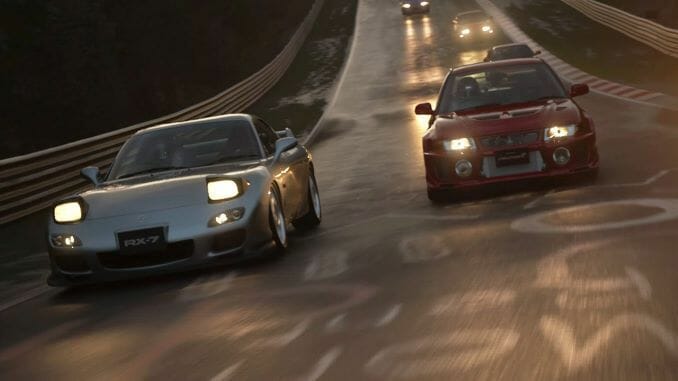Gran Turismo 7 is a very good racing game. The handling hits the perfect balance between sim-like precision and arcade accessibility, a balancing act of abstraction that combined with the incredible vibration implementation, is functionally as close as you can get to the sensation of racing a car on a gamepad. On the track, the artifice fades away. Even me, someone who’s primary racing game thrills are Burnout and Outrun, ended the first day with all the assists turned off saying shit like “apex” and “slipstream” to myself.
That’s not really what anyone is talking about right now. The game is currently at the center of a controversy caused by a recent patch that took the game offline and rendered it functionally unplayable for over a full day, while drastically nerfing the payouts from certain events. This was a frankly hilarious PR blunder, a cock-up designed in a lab to highlight to issues that—while unpopular—are generally accepted by the wider audience as the realities of modern gaming.
At the time of writing here’s where things currently stand: GT7 players are using a script with the remote play app to automatically run races while doing other things and thus build up enough credits to presumably, at some point, actually play the videogame. Nobody yet knows if Polyphony will respond with another patch and push this ridiculous arms race even further. Maybe they will, and there’s further antagonism between the playerbase and the publisher. Maybe the negative press is too much, and they raise rewards and everything settles down. Whichever way it ends up going, it will do nothing to change the core design principles that resulted in the absurd situation of a $70 console game that people are modding on a PC in order to play it less.
This is not in any way a new phenomenon, and is unfortunately par for the course as games shift further and further to perpetual monetization, creating systems designed to pull on as many psychological levers as possible to extract a constant flow of money from its audience. But conversations and controversies about these games often focus on the immediate costs and consequences. This car is too expensive. This time limit is too tight. And that’s understandable, as these complaints aren’t wrong and the games would be better if they were reversed. But the perfect version of Gran Turismo 7’s progression, where the rewards are plentiful and grinding is eliminated, would still be infinitely worse than what came before.
Racing games are constantly facing a design struggle where the moment to moment play is simultaneously extremely limited and theoretically infinite. Ultimately, no matter what, the game will consist of driving a car around a track, for as long as the game is intended to last. The game designer’s role is to shape those hours into a coherent structure. Gran Turismo games of yore used a structure now affectionately referred to as CaRPG (sometimes, it’s an ill-defined term applied broadly), short for “car role-playing game,” where both the permanence and limited nature of resources were used to give context to races and impress interesting decisions on the player. Do you upgrade your engine to have an easier time in one specific race? Or do you compete at a disadvantage to save up for a brand new car, which would be cheaper in the long run? At their best, these progression systems functioned not just as external structures providing context and narrative to a freeform simulation, but as organic difficulty modes allowing players to tackle the various challenges in the ways that they found most comfortable.
In many ways, Gran Turismo 7 is far more generous than this old system. The initial progression showers you with a large selection of free cars, and the journey to credits is both frictionless and varied. Unless you really want a specific car from the dealership, you never have to spend a single in-game credit to engage with the primary campaign of the game. The problem with Gran Turismo 7 isn’t that it’s stingy, or selfish—although it certainly is these things—but something far more inherent to the way it structures its play. Superficially it retains similarities to the old CaRPG formula, as you still compete in races to buy cars, balance upgrades and maintain your garage. Yet its nature is changed completely, from one about carving your own path through a challenging racing economy to one about leaving your PC on overnight to farm credits. You can no longer sell your own cars to make money. The most expensive cars have limited purchase windows. No longer does the economy give context to races; the races give context to the economy. The systems may be built from the same parts but the tail now wags the dog.
But what is to be done? Good manners dictate a piece like this end with some kind of call to action, or note of optimism for brighter futures. But that isn’t happening. The toothpaste is not going back in the tube and they’re not going to make PS2 games again, nor should bringing back PS2 games be the cornerstone of anyone’s opposition to corporate exploitation. But it doesn’t have to be that deep, these are only videogames after all. And sometimes videogames were better before.
Jackson Tyler is an nb critic and podcaster at Abnormal Mapping. They’re always tweeting at @headfallsoff.
